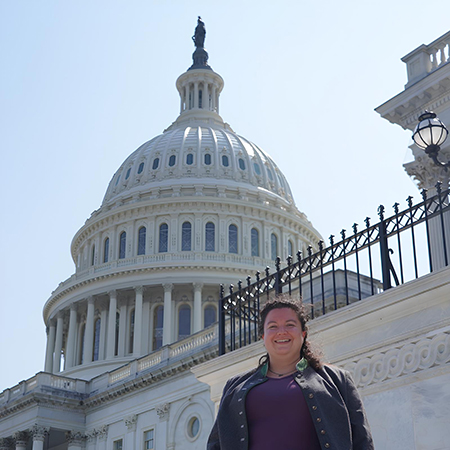January 19, 2024
By Ian Sargent
Graduates of Georgia Tech’s George W. Woodruff School of Mechanical Engineering thrive across an array of industries and roles, so it’s no surprise that one alumna, Elisabeth Deeb, ME 2013, M.S. MT 2015, found herself spending the past year busy with purpose in the heart of Washington D.C. as an ASME Congressional Fellow in Advanced Manufacturing.
Sponsored by the American Society of Mechanical Engineers (ASME) in conjunction with the American Association for the Advancement of Science (AAAS), the Congressional Fellowship program is extremely selective; it’s more than just an opportunity for professional development, as fellows like Deeb spend 12 months in Washington providing technical expertise to lawmakers and taking an active role in shaping future policy.
Policy Impact at the Heart of Government
As vice president of business development and senior project manager with the consulting firm T&M Associates, Deeb’s background involved work with agencies representing governments in Europe and the Middle East. She also worked extensively with key suppliers to major companies like Saudi Aramco and ADNOC, helping guide those suppliers through regulatory requirements and acquiring an expert understanding of the region’s supply chain ecosystem.
“I realized that I knew a lot about how the foreign governments I worked with operated, but not my own,” Deeb said. “What are the mechanisms that drive decision-making and other things? I knew how that worked overseas and wanted to figure out how that worked in the U.S.”
Looking to build upon her international experience, Deeb applied for the Congressional Fellowship and, after her selection into the program, started working in the office of Senator Raphael Warnock in September of 2022, where she consulted on a diverse range of topics related to entertainment, manufacturing, agriculture, and supply chain policy.
In practice, this meant Deeb offered policy recommendations, attended constituent and committee meetings, and helped ask or answer pertinent technical questions.
One area of focus for Deeb was permitting reform. Obtaining federal permits for large-scale infrastructure projects is often time-consuming and costly. Each project presents unique challenges, making effective holistic changes to the permitting process difficult. Deeb distilled these complex issues into manageable, actionable items. Drawing from her international experience, Deeb recognized the downstream benefits of permit reform, especially as the U.S. transitions to renewable energy sources.
“Whether it's oil and gas, whether it's transmission lines for offshore wind or solar, we need the infrastructure to be updated and expanded and that's going to require permits,” Deeb emphasized. “We just need to make sure that it's done safely and responsibly, and not cost companies decades and billions of dollars to get their permits.”
Navigating AI and the Entertainment Industry
One of Deeb’s major accomplishments during her fellowship was establishing a permanent entertainment industry portfolio within the senator’s office. The portfolio—a collection of issues or areas of policy a legislator will oversee—was a long-term project Deeb knew would have a lasting impact given the global presence Georgia has in the music and film industries.
“Although entertainment is 6.9% of the United States’ GDP we tend to forget that it exists when it comes to policy,” Deeb said.
Deeb connected with industry leaders to hear concerns, ranging from pandemic recovery to retaining state-educated graduates. Her focus changed when OpenAI released its AI-powered ChatGPT in late fall of 2023, which put a spotlight on the technology’s vast and disruptive potential.
Quite suddenly, Deeb was doing a lot of work at the intersection of AI and copyright law, with artists and others wary of the potential misuse of their creative works or personas. She helped organize an AI roundtable, bringing artists, industry executives, and policymakers together to begin constructive discussions on the topic.
Despite the technical complexities concerning AI, Deeb’s time at Georgia Tech meant she was ready for the challenge. A classically trained violinist, Deeb earned her master’s degree in music technology and studied the use of AI in music software. Her unique perspective allowed her to effectively engage with a broad cross-section of industry insiders, from film and television to publishing and video games.
“I think I'm probably the first and only music technology graduate who has been on the Hill,” Deeb joked. “Just having that knowledge and credibility goes a long way with constituents. Half of your job is working with constituents and making sure you're taking in all the information you can, but also making sure that they are being heard and working with them throughout the process of policy making.”
Future Perspectives
The Congressional Fellowship not only provided Deeb with an insider's view of the government but also served as a conduit for collaboration. Fellows are placed in all three branches of government, both legislative chambers and across the political spectrum, fostering a network that Deeb and her peers utilized.
“It's allowed for some interesting coalition building around bills,” Deeb said. “I've gotten to work with quite a few offices on both sides of the aisle on certain issues.”
Deeb's journey exemplifies the far-reaching impact of a Tech education and showcases how skills honed at the Woodruff School can be leveraged to make a significant impact after graduation. While there are no immediate plans to dive back into policy work, her words echo the possibility of a return, emphasizing the importance of finding the right role.
“I enjoyed my time in the Hill,” Deeb said. “I would definitely be up for going back, but finding a position that makes a lot of sense takes a little bit of time.”

